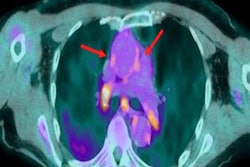
Even patients who have recovered from COVID-19 may experience long-term negative cognitive effects due to the disease -- and the phenomenon doesn't necessarily show up in brain imaging or laboratory results, say researchers in a study published May 26 in the Journal of NeuroVirology.
The findings offer sobering evidence of COVID-19's far-reaching impact, wrote a team led by Dr. Rafi Hadad of Clalit Health Services in Haifa, Israel, and the University of California, San Francisco.
"Cognitive decline may affect otherwise healthy patients post-COVID, independent of disease severity," the group wrote. "Our examination identified abnormalities in executive function, attention, and phonemic fluency. These findings occurred despite normal laboratory tests and imaging findings."
The world has been coping with COVID-19 for more than two years, but researchers are still in the dark about the disease's long-term effects, particularly its neurologic manifestations, the study authors noted.
"Despite emerging evidence that COVID-19 has neurologic consequences, it is yet unclear whether SARS-CoV-2 is neurotropic in humans," they wrote. "Furthermore, the exact mechanism by which SARS-CoV-2 affects the central nervous system remains unclear."
To explore the disease's long-term cognitive impact, Hadad and colleagues conducted a study that included 46 post-COVID patients who were experiencing cognitive symptoms after recovery, such as memory problems and mood disturbances, and had been referred for further consultation.
Most of these patients (78%) had experienced nonsevere disease; each underwent a neurologic workup that included a medical history, inventory of symptoms, neurological exam, laboratory tests (blood count, kidney function, electrolytes, thyroid function, C-reactive protein), the Montreal Cognitive Assessment (MoCA), and brain CT or MRI.
Imaging and laboratory findings were normal, and patients' overall MoCA scores did not differ from typical ranges. However, the team did find that MoCA test results for executive function, particularly in language fluency and attention, reflected impairment.
| MoCA results in post-COVID-19 patients compared with normal control ranges | |||
| MoCA index (score range) | Score for normal controls | Score for patients post-COVID | p-value |
| Attention index (0-18) | 17 | 14.5 | < 0.001 |
| Executive function (0-13) | 12 | 10.4 | < 0.001 |
| Language index (0-6) | 5.5 | 4.3 | < 0.001 |
| Memory index (0-15) | 10.4 | 10.7 | 0.60 |
| Orientation index (0-6) | 5.9 | 5.9 | 0.88 |
| Visuospatial index (0-7) | 6.3 | 6.1 | 0.20 |
These long-term cognitive symptoms may be complications from lung inflammation caused by COVID-19, Hadad's group hypothesized.
"Attention, memory, verbal fluency, processing speed, and executive functioning impairment are well-known complications after severe inflammation of the lungs with multiple mechanisms suspected," the team explained.
In any case, the study suggests that not only should ongoing cognitive symptoms in those who have recovered from COVID-19 be investigated -- even if lab and imaging results are normal -- but that more research is needed, the authors concluded.
"Additional systemized studies are needed to track the real impact and long-term sequelae of COVID-19 infection on brain health and cognitive function," they wrote.



















